Notes from the Editors
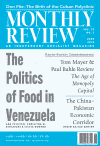
With the eruption in March of the scandal around Cambridge Analytica and Facebook, articles raising the alarm on “surveillance capitalism” are suddenly everywhere. The term, which was coined in MR in August of 2014, was developed to highlight the links between digital spying systems and contemporary capitalism as a whole. Academic interpretations of the concept effectively divorced surveillance capitalism from class analysis, and from the overall political-economic structure of capitalism—as if surveillance could be abstracted from monopoly-finance capital as a whole. | more…
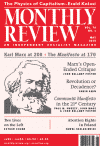
The neoliberal restructuring of U.S. higher education is widely recognized, but nonetheless treated superficially and piecemeal in most left analyses, with little critical understanding of its inner political-economic logic. It is here that American observers have the most to learn from their British counterparts. | more…
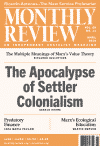
Building on Marx’s own open-ended critique, three revolutionary new developments have recently arisen in Marxist theory, addressing social reproduction, the expropriation of nature, and racial capitalism. | more…
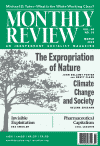
Nuclear weapons have been used again and again—most often by the United States—as threats directed at various nation-states to achieve geopolitical ends. Each such use takes us closer to the precipice of all-out nuclear war. | more…

A recent article by the economist Riccardo Bellofiore includes a significant treatment of Paul Sweezy’s dynamic theory of monopoly capital. But the essay’s most noteworthy contributions, in our view, relate to Harry Magdoff and Sweezy’s role in the 1970s and ’80s in developing a theory of financialization, and what their analysis can tell us about our current situation. | more…
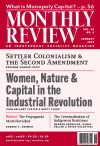
The recent rise of social reproduction theory represents one of the most remarkable attempts to extend historical materialism in our time. The Review of the Month in this issue, “Women, Nature, and Capital in the Industrial Revolution,” is intended as a contribution to this rapidly growing body of work. | more…
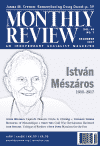
István Mészáros, who died on October 1 at the age of eighty-six, was a leading Marxist theorist and a frequent contributor to MR. No political philosopher of our age has reached nearly so far in joining philosophy with political-economic critique, or in systematically addressing the question of the movement toward socialism. | more…
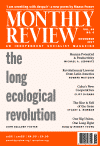
Over the last three decades, Monthly Review has stood out as a major source of ecosocialist analysis. This has been especially evident in recent months, with the publication by Monthly Review Press of three pathbreaking books: Kohei Saito, Karl Marx’s Ecosocialism: Capital, Nature, and the Unfinished Critique of Political Economy; Ian Angus, A Redder Shade of Green: Intersections of Science and Socialism; and Fred Magdoff and Chris Williams, Creating an Ecological Society: Toward a Revolutionary Transformation. | more…
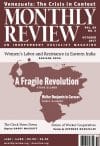
The groups fighting white supremacy in Charlottesville and elsewhere represent a cross-section of the U.S. left, from socialists to communists to anarchists. Together, they affirm that to combat the new right-wing resurgence, it is necessary to combat capitalism itself. | more…
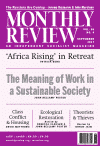
The publication last month of The Age of Monopoly Capital: The Selected Correspondence of Paul A. Baran and Paul M. Sweezy, 1949–1964, edited by Nicholas Baran and John Bellamy Foster, constitutes a landmark for Monthly Review Press. A historical document in itself, The Age of Monopoly Capital is not simply about the writing of their magnum opus, but also provides a window onto an entire era of American life. | more…

For this special issue, MR has invited some of the most profound left thinkers in the world to reflect on the legacy of revolutions and counterrevolutions around the world since 1917. Naturally, these authors do not all offer similar perspectives or come to the same conclusions. Nor should they—the historical issues are too complex and the human stakes are too high. | more…
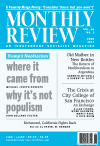
In the last several years, the left has experienced a series of defeats, and the grip of capital has tightened. The recent reversals in Latin America are a warning. We live in an age where a new era of revolutionary social change, unlike any that came before it, is the only hope—not just for ourselves, but for the chain of human generations. | more…
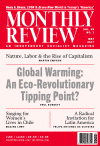
The fact that alt-right figures are playing key roles in the Trump administration, while circumventing the Senate confirmation process, is an ominous indication of the wider effort by the administration to construct a new political order, further concentrating power in the White House and bringing the rest of the state into line. | more…












